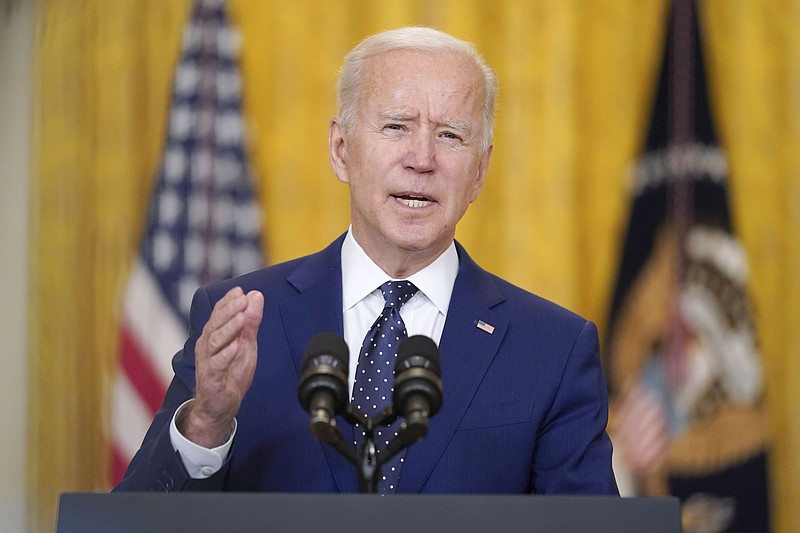WASHINGTON (AP) - The Biden administration announced Thursday the U.S. is expelling 10 Russian diplomats and imposing sanctions against dozens of companies and other people, holding the Kremlin accountable for interference in last year's presidential election and the hacking of federal agencies.
The sweeping measures are meant to punish Russia for actions U.S. officials said cut to the core of American democracy and to deter future acts by imposing economic costs on Moscow, including by targeting its ability to borrow money. The sanctions are certain to exacerbate tensions with Russia, which promised a response, even as President Joe Biden said the administration could have taken even more punitive measures but chose not to in the interests of maintaining stability.
"We cannot allow a foreign power to interfere in our democratic process with impunity," Biden said at the White House.
Sanctions against six Russian companies that support the country's cyber efforts represent the first retaliatory measures against the Kremlin for the hack familiarly known as the SolarWinds breach, with the U.S. explicitly linking the intrusion to the SVR, a Russian intelligence agency. Though such intelligence-gathering missions are not uncommon, officials said they were determined to respond because of the operation's broad scope and the high cost of the intrusion on private companies.
The U.S. also announced as part of the same executive order sanctions on 32 individuals and entities accused of attempting to interfere in last year's presidential election, including by spreading disinformation. U.S. officials alleged in a declassified report last month that Russian President Vladimir Putin authorized influence operations to help Donald Trump in his unsuccessful bid for re-election as president, though there's no evidence Russia or anyone else changed votes.
The actions, foreshadowed by the administration for weeks, signal a harder line against Putin, whom Trump was reluctant to criticize even as his administration pursued sanctions against Moscow. They are the administration's second major foreign policy move in two days, following the announcement of troop withdrawals from Afghanistan. Until now, Biden has largely focused on the coronavirus pandemic and economy in his first months in office.
Biden said Thursday that when he advised Putin days earlier of the forthcoming measures - which included expulsion of the 10 diplomats, some of them representatives of Russian intelligence services - he told the Russian leader "that we could have gone further but that we chose not to do so."
"We want," he said, "a stable, predictable relationship."
Even so, Russian officials spoke of a swift response, with Deputy Foreign Minister Sergei Ryabkov warning "a series of retaliatory measures will come in the nearest time."
Other American measures are expected as well, though the administration is not likely to announce them. Officials have been advising their response to Russia would be in ways seen and unseen.
The sanctions announced Thursday are the latest in a series of actions that successive presidential administrations have taken to counter Russian behavior seen as antagonistic. It is unclear whether the new U.S. actions will result in changed behavior, especially since past measures by the U.S. - Trump and Barack Obama expelled individual diplomats during their presidencies - have failed to bring an end to Russian hacking.
However, experts suggest this latest round, even while not guaranteed to curb cyberattacks, might have more resonance because of its financial impact: The order makes it more difficult for Russia to borrow money by barring U.S. banks from buying Russian bonds directly from the Russian Central Bank, Russian National Wealth Fund and Finance Ministry. It could complicate Russian efforts to raise capital and give companies pause about doing business in Russia.
The impact of the sanctions and the U.S. willingness to impose costs will be weighed by Putin as he evaluates his next steps, though he is unlikely to make "a 180" degree pivot in his behavior, said Daniel Fried, a former assistant secretary of state for European and Eurasian Affairs.
"The issue is, how can we push back against Putin's aggression, while at the same time keeping open channels of communication and continuing to cooperate with Russia in areas of mutual interest," Fried said. "And it seems to me the Biden administration has done a pretty good job framing up the relationship in exactly this way."
Eric Lorber, a former Treasury Department official, said the administration is "surely trying to balance putting pressure on Russia, pushing back on Russia, while at the same time, not engaging in full-fledged economic warfare."
The White House did not impose sanctions related to separate reports Russia encouraged the Taliban to attack U.S. and allied troops in Afghanistan, saying instead Biden was using diplomatic, military and intelligence channels to respond.

